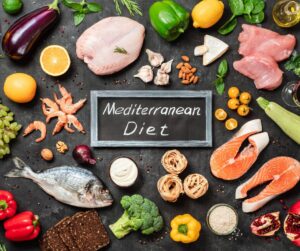The Mediterranean Diet, often lauded as one of the healthiest diets globally, is more than just a passing trend. Rooted in the traditional eating habits of countries bordering the Mediterranean Sea, this diet is a culmination of rich flavors, diverse ingredients, and a plethora of health benefits. But what makes it stand out from the rest? Let’s embark on a culinary journey to understand the essence of the Mediterranean Diet.

Mediterranean Diet: A Brief Overview
The Mediterranean Diet is not just about food; it’s a lifestyle. It emphasizes:
- Fresh Fruits and Vegetables: The backbone of the diet, providing essential vitamins and minerals.
- Whole Grains: A source of complex carbohydrates for sustained energy.
- Lean Proteins: Including fish, poultry, and legumes.
- Healthy Fats: Primarily from olive oil and nuts.
- Moderate Wine Consumption: Typically red wine, consumed in moderation.
- Herbs and Spices: For flavor, reducing the need for salt.
Historical Roots of the Diet
The Mediterranean Diet’s origins can be traced back thousands of years. It’s deeply rooted in the:
- Ancient Greek and Roman Cuisines: Where olive oil, bread, and wine were staples.
- North African Influence: Introducing spices and unique cooking methods.
- Middle Eastern Contributions: With the introduction of fruits, grains, and legumes.
Health Benefits: More than Meets the Eye
The Mediterranean Diet is not just about tantalizing your taste buds; it’s a powerhouse of health benefits:
- Heart Health: Regular consumption of olive oil and nuts has been linked to reduced heart disease risks.
- Weight Management: The diet promotes healthy weight loss and maintenance.
- Brain Health: Ingredients like fish are rich in omega-3 fatty acids, which are beneficial for brain health.
- Reduced Cancer Risk: The antioxidants in fruits and vegetables can help reduce cancer risks.
- Diabetes Control: The diet can help regulate blood sugar levels.
- Improved Digestion: High fiber content aids in digestion.
- Mood Enhancement: A balanced diet can lead to improved mental health.
Mediterranean vs. Western Diet: A Comparison
While the Mediterranean Diet focuses on whole foods and healthy fats, the Western Diet often leans towards processed foods and unhealthy fats. Here’s a breakdown:
- Caloric Intake: The Mediterranean Diet emphasizes quality over quantity.
- Fat Sources: Olive oil and nuts vs. saturated and trans fats.
- Protein Sources: Fish and poultry vs. red and processed meats.
- Carbohydrates: Whole grains vs. refined grains.
Incorporating the Mediterranean Diet into Your Lifestyle
Starting with the Mediterranean Diet is a piece of cake! Here’s how:
- Start Small: Incorporate one element at a time.
- Shop Smart: Opt for fresh, organic produce.
- Cook at Home: Experiment with Mediterranean recipes.
- Stay Active: Combine the diet with regular physical activity.
Challenges and Criticisms
No diet is without its critics. Some challenges and criticisms include:
- Cost: Fresh, organic produce can be expensive.
- Availability: Some ingredients might not be readily available everywhere.
- Misconceptions: It’s not about eating large amounts of pasta and pizza!
FAQs
What is the primary source of fat in the Mediterranean Diet?
Olive oil is the primary source of fat, known for its heart-healthy properties.
Is red meat allowed in the Mediterranean Diet?
Red meat is consumed in moderation, with a focus on lean cuts.
Can I drink alcohol on the Mediterranean Diet?
Yes, but in moderation. Red wine is often the preferred choice.
How does the Mediterranean Diet aid in weight loss?
It emphasizes whole foods, healthy fats, and portion control, promoting sustainable weight loss.
Is the Mediterranean Diet suitable for vegetarians?
Absolutely! With a focus on plant-based foods, it’s easily adaptable for vegetarians.
What makes the Mediterranean Diet different from other diets?
It’s a lifestyle choice, emphasizing overall well-being, not just weight loss.
Conclusion
The Mediterranean Diet, with its rich history, diverse flavors, and numerous health benefits, is more than just a dietary choice—it’s a journey towards a healthier, happier life. Whether you’re looking to improve your heart health, manage your weight, or simply enjoy delicious meals, the Mediterranean Diet offers something for everyone. So, why wait? Embark on this Mediterranean journey today and embrace a lifestyle of wellness.